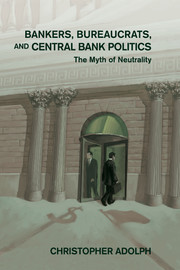Book contents
- Frontmatter
- Contents
- List of figures
- List of tables
- List of boxes
- Abbreviations
- Acknowledgements
- 1 Agents, institutions, and the political economy of performance
- 2 Career theories of monetary policy
- 3 Central banker careers and inflation in industrial democracies
- 4 Careers and the monetary policy process: Three mechanism tests
- 5 Careers and inflation in developing countries
- 6 How central bankers use their independence
- 7 Partisan governments, labor unions, and monetary policy
- 8 The politics of central banker appointment
- 9 The politics of central banker tenure
- 10 Conclusion: The dilemma of discretion
- References and Author index
- Subject index
- About the type, figures, and data
- Other Books in the Series
10 - Conclusion: The dilemma of discretion
Published online by Cambridge University Press: 05 April 2013
- Frontmatter
- Contents
- List of figures
- List of tables
- List of boxes
- Abbreviations
- Acknowledgements
- 1 Agents, institutions, and the political economy of performance
- 2 Career theories of monetary policy
- 3 Central banker careers and inflation in industrial democracies
- 4 Careers and the monetary policy process: Three mechanism tests
- 5 Careers and inflation in developing countries
- 6 How central bankers use their independence
- 7 Partisan governments, labor unions, and monetary policy
- 8 The politics of central banker appointment
- 9 The politics of central banker tenure
- 10 Conclusion: The dilemma of discretion
- References and Author index
- Subject index
- About the type, figures, and data
- Other Books in the Series
Summary
If men were angels, no government would be necessary.
If angels were to govern men, neither external
nor internal controls on government would be necessary.
In framing a government which is to be administered
by men over men, the great difficulty lies in this:
you must first enable the government to control the governed;
and in the next place oblige it to control itself.
JAMES MADISON, Federalist 51It's simple. We own them, we tell them what to do and if the directors don't, we sack them and get people who can.
Swedish Finance Minister Anders Borg on nationalized banksTHE PIECES OF THIS BOOK build up a single encompassing theory: we cannot understand the politics of monetary policy – from the selection of central bankers and central bank institutions to the creation of short run economic outcomes – unless we understand the objectives of the central bank officials who actually make monetary policy. This theory rests on the insight that economic performance results not from institutions or interests alone, but from their interaction across the political economy.
The first part of this book laid out a career theory of monetary policy centered on the idea that past experience (career socialization) and the shadow of the future (career incentives) lead some central bankers to favor tighter monetary policy, and others to take a easier stance.
- Type
- Chapter
- Information
- Bankers, Bureaucrats, and Central Bank PoliticsThe Myth of Neutrality, pp. 304 - 318Publisher: Cambridge University PressPrint publication year: 2013



